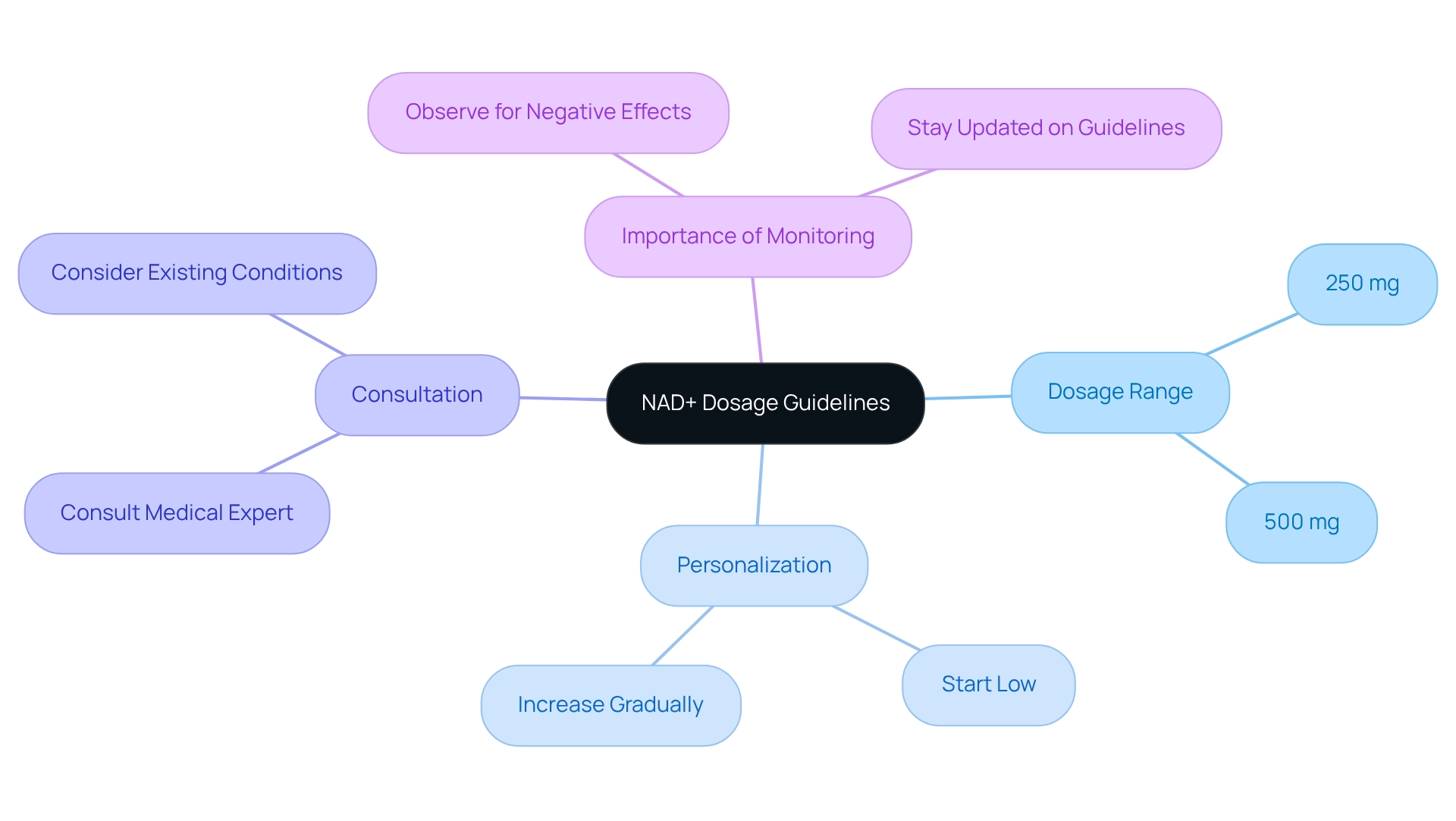NAD+ Dosage Per Day: Guidelines for Safe Supplementation
Overview
The article outlines essential guidelines for the safe supplementation of NAD+. It recommends a daily dosage range of 250 mg to 500 mg, emphasizing the importance of starting with a lower dose and consulting a healthcare professional. This guidance is backed by research that indicates proper management of NAD+ levels can enhance cellular health and potentially mitigate age-related decline. Consequently, it highlights the necessity of personalized approaches to supplementation.
Introduction
In the quest for optimal health and longevity, NAD+ (Nicotinamide Adenine Dinucleotide) plays a crucial role in cellular vitality. This essential coenzyme, found in every cell, is pivotal not only for energy metabolism but also for DNA repair and the intricate regulation of various biological processes. As we age, NAD+ levels decline, which can lead to diminished cellular function and increased susceptibility to age-related ailments.
Recent research highlights the potential of NAD+ supplementation to counteract these effects. Could improved energy levels and enhanced vitality be within reach? Understanding the right dosage, potential side effects, and the importance of integrating lifestyle strategies is vital for anyone looking to harness the full benefits of this powerful coenzyme. Taking these steps can pave the way for a healthier, more vibrant life.
Explore the Role of NAD+ in Cellular Health
Nicotinamide Adenine Dinucleotide (NAD+) is an essential coenzyme present in every cell, crucial for energy metabolism and tissue repair. It plays a pivotal role in redox reactions, which convert nutrients into usable energy. Beyond energy production, NAD+ is vital for DNA repair and the regulation of various biological functions, including aging and inflammation.
Studies indicate that as we age, levels of NAD+ decline, leading to reduced cell function and increased susceptibility to age-related illnesses. Recent research emphasizes that preserving sufficient levels of this coenzyme can mitigate oxidative stress, a significant factor in cellular deterioration. This connection underscores the importance of NAD+ in enhancing overall cell health.
Significantly, Trimethylglycine (TMG) can provide the essential methyl groups that NMN reduces, ensuring optimal cell function and amplifying the benefits of NAD+ support. Case studies reveal that individuals incorporating NAD+ enhancers into their health routines often report increased energy levels and improved vitality, reinforcing the coenzyme’s potential advantages.
Furthermore, expert opinions suggest that NAD+ enhancers may offer a promising approach to counteracting the effects of aging. As the body’s natural coenzyme levels wane, restoring this compound could support not only energy metabolism but also cellular repair processes, contributing to healthier aging. Understanding these dynamics, particularly the synergy between TMG and NMN, is crucial for anyone considering support as part of their longevity strategy. For optimal results, adhering to specific dosage guidelines for this enhancement is recommended to maximize its benefits.
Determine Safe and Effective NAD+ Dosage Guidelines
Following the suggested NAD+ dosage per day guidelines is essential for maximizing benefits and minimizing risks associated with its use. Current guidelines indicate a standard NAD+ dosage per day range of 250 mg to 500 mg, which is tailored to personal wellness objectives and circumstances. It is wise to start adding nutrients with a lower dose, gradually increasing it while closely observing for any negative effects. Consulting a medical expert before beginning any dietary additions is essential, especially for individuals with existing medical issues or those on other medications. This personalized approach not only aligns nutrients with individual health requirements but also enhances the overall effectiveness of the regimen.
Recent studies underscore the significance of these guidelines. For example, a trial evaluating biological age among participants taking NMN revealed that those on a placebo experienced a notable rise in biological age, whereas no such alterations were seen in the NMN group. This emphasizes the potential anti-aging benefits of this compound, reinforcing the necessity for careful management of NAD+ dosage per day. As we approach 2025, it is essential to stay updated on evolving guidelines and professional counsel regarding safe support for this compound to ensure optimal health results.

Understand the Risks: Side Effects and Interactions of NAD+ Supplements
The addition of NAD is widely considered safe; however, some individuals may encounter side effects, including nausea, fatigue, and headaches. Typically mild, these side effects can often be alleviated by adjusting the dosage. Significantly, nicotinamide adenine dinucleotide supplements may interact with specific medications, particularly those that influence liver enzymes, potentially altering how these medications are processed. Therefore, consulting a healthcare provider before initiating NAD supplementation is essential, especially for individuals with pre-existing health conditions or those taking other medications. This proactive approach helps reduce possible interactions and ensures that individuals can make informed choices about their health.
Research indicates that nicotinamide riboside, a variant of nicotinamide adenine dinucleotide, shows promise in reducing inflammation—particularly in conditions like nonalcoholic fatty liver disease (NAFLD). However, additional studies are necessary to fully understand its effects and safety profile. A long-term study found that nicotinamide at doses of 25 to 50 mg per kilogram of body weight was safe for children, suggesting a positive safety margin under medical supervision.
Healthcare professionals emphasize the importance of understanding how these supplements interact with medications. Experts note that without robust clinical trials in humans, it is difficult to weigh the risks against the benefits of various NAD+ supplements. Consequently, individuals should remain vigilant in monitoring their wellness and discussing any concerns with their medical practitioners to ensure safe and effective support. This aligns with broader investigations into anti-aging strategies through quality nutrition and innovative therapies, as well as the role of dietary supplements in enhancing well-being and longevity.
Integrate Lifestyle Strategies to Maximize NAD+ Benefits
To fully utilize the advantages of NAD supplementation, it is essential to adopt lifestyle strategies that enhance cellular health while considering the NAD+ dosage per day. A diet rich in high-quality animal-based foods, like those eaten by the Hunza people, is especially advantageous, as these foods are high in niacin, an essential nutrient for NADH production. For instance, including foods such as beef liver and ribeye steak can significantly enhance levels of nicotinamide adenine dinucleotide, reflecting the dietary habits of the Hunza Valley inhabitants who consume a diet that supports their extraordinary longevity.
Furthermore, regular physical activity, particularly high-intensity interval training (HIIT), has been demonstrated to effectively increase levels of nicotinamide adenine dinucleotide. The daily physical work and walking habits of the Hunza people serve as natural methods of exercise that not only fortify the body but also improve metabolic efficiency, thus aiding in the production of nicotinamide adenine dinucleotide. In addition, intermittent fasting can encourage the body’s natural NAD production, improving its availability for cellular functions, and maintaining a proper NAD+ dosage per day through restorative sleep and controlling stress with mindfulness techniques is essential for sustaining optimal NAD levels. Research indicates that excessive UV exposure can deplete NAD+ as the body utilizes it for skin cell repair, underscoring the importance of sun safety in preserving these levels. By combining supplementation with these dietary and lifestyle strategies, individuals can significantly improve their overall health and longevity, making informed choices that support their well-being.
Conclusion
NAD+ supplementation holds significant promise for enhancing cellular health and combating age-related decline. This essential coenzyme plays a crucial role in energy metabolism, DNA repair, and the regulation of vital biological processes. As aging leads to a natural decline in NAD+ levels, the potential benefits of supplementation become increasingly relevant. Research indicates that maintaining adequate NAD+ levels can mitigate oxidative stress and support overall cellular function, which is essential for promoting vitality and longevity.
However, it is imperative to approach NAD+ supplementation with care. Adhering to recommended dosage guidelines—typically between 250 mg to 500 mg per day—ensures that individuals can maximize the benefits while minimizing potential side effects. Consulting healthcare professionals before beginning supplementation is essential, particularly for those with pre-existing health conditions or those taking other medications. This personalized approach not only enhances safety but also aligns supplementation with individual health goals.
In addition to supplementation, integrating lifestyle strategies can further amplify the benefits of NAD+. Emphasizing a nutrient-rich diet, regular physical activity, restorative sleep, and stress management are all vital components of a holistic approach to health. These strategies not only support NAD+ production but also contribute to improved overall well-being. By embracing both supplementation and healthy lifestyle choices, individuals can take proactive steps towards a healthier, more vibrant life, harnessing the full potential of NAD+ for optimal health and longevity.
Frequently Asked Questions
What is NAD+ and why is it important for cellular health?
NAD+ (Nicotinamide Adenine Dinucleotide) is an essential coenzyme found in every cell, crucial for energy metabolism, tissue repair, DNA repair, and the regulation of biological functions such as aging and inflammation.
How does aging affect NAD+ levels in the body?
As we age, levels of NAD+ decline, leading to reduced cell function and increased susceptibility to age-related illnesses.
What role does NAD+ play in energy metabolism?
NAD+ is vital for redox reactions that convert nutrients into usable energy, making it essential for energy metabolism.
How can NAD+ levels impact oxidative stress and cellular health?
Preserving sufficient levels of NAD+ can mitigate oxidative stress, which is a significant factor in cellular deterioration, thus enhancing overall cell health.
What is the relationship between Trimethylglycine (TMG) and NAD+?
TMG provides essential methyl groups that NMN reduces, ensuring optimal cell function and amplifying the benefits of NAD+ support.
What benefits do individuals report when incorporating NAD+ enhancers into their health routines?
Individuals often report increased energy levels and improved vitality when incorporating NAD+ enhancers into their health routines.
Can NAD+ enhancers help counteract the effects of aging?
Yes, NAD+ enhancers may offer a promising approach to counteracting aging effects by supporting energy metabolism and cellular repair processes.
What should individuals consider when using NAD+ enhancers for longevity?
It is important to adhere to specific dosage guidelines for NAD+ enhancement to maximize its benefits.






